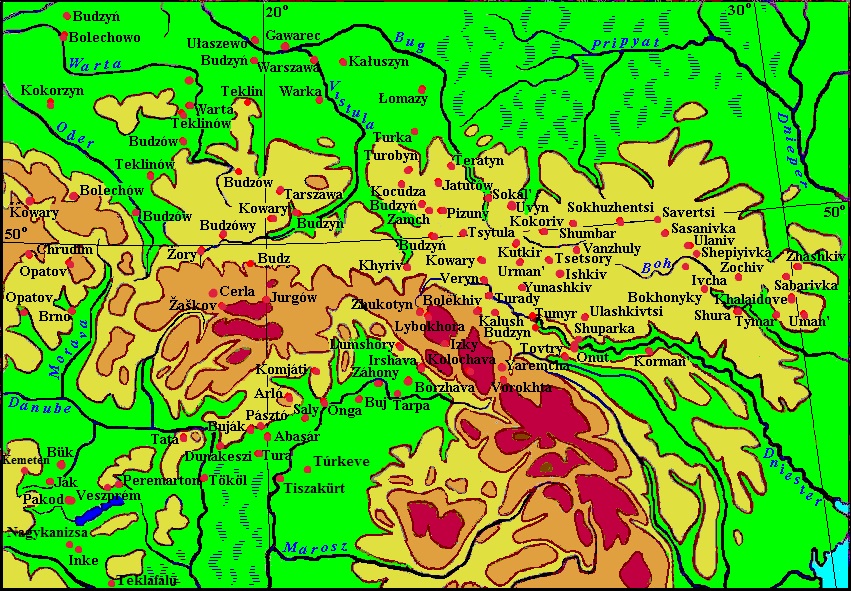Ancient Turkic Place Names in Central and Northern Europe
The oldest Turkic toponymy in Central and Northern Europe is one of the arguments in support of the Turkic origin of the Corded Ware culture (CWC). The only descendants of the creators of this culture are the modern Chuvash people (see section Türks as Carriers of the Corded Ware Cultures), so their language has preserved the features of the Proto-Turkic language more than other Turkic. Therefore it was used to interpret Turkic toponymy. This may cause mistrust because some place names must have existed for about four thousand years. However, Turkic languages change little over time:
Turkic dialect, known since the XII century still retains its essential features and slightly changed though since they were first witnessed, it took nearly a millennium (MEILLET A. 1954: 36)
These are fairly recent historical times when the rate of language changes has already accelerated under the influence of the general intensification of life and more advanced means of communication, which contributed to the spread of new formations. Four thousand years ago, languages developed even more slowly, although at the very beginning of their formation, they developed quite quickly, as evidenced by the significant differences between Chuvash and other Turkic languages.
The highest density of Turkic place names is noted in Western Ukraine and Eastern Poland. Hence the Türks (Turkic people) as carriers of CWC moved along the Carpathian Mountains to the west and north to the Baltic. Sites of CWC are absent in Hungary, thus the Türks moved there at the Scythian time.
Multitudes of Turkic place names in
Hungary, Poland, and Western Ukraine.
The map scale doesn't show all place names in their greatest concentrations. Furthermore, Turkic place names are found in large quantities in the Czech Republic, Germany, the Baltic States, Finland, and Sweden, and while continuing the search it becomes impossible to display their extension on conventional maps. In such circumstances, there is no choice but to apply the new data to the map in the system of Google Map (see below).
On the map, purple dots mark localities with the Turkic origin of the name, which may correspond to the times of CWC or close to them. Maroon – the later, of the Scythian period.

POLAND
When the search for place names of Turkic origin in Poland, as always, these were more likely which were a part of the clusters or had an explanation in the motivation of naming according to natural conditions or analogy in modern names. For example, two villages with strange names for the Poles Shury and Shurpily are located among the Masurian marshes. Taking into account Chuv shur "swamp", the search for decrypting the second word is going to be successful. If Chuv. pile "buzz" (about mosquitoes) add to Chuv. shura, the name can be understood as "mosquito swamp". Buzzing mosquito clouds over the marsh gave a good reason for such a name. The same explanation could have the name of the town of Żary southwest of the city of Katowice, but it is better to refer to it as Chuv. shură "white". Confidence for this assumption consists in the presence of names with the same definition biały "white": Bielsko-Biała, Biała, Biały Dunajec in the nearby locality. Below are served several Turkic place names in Poland:
Bolechowo, a village in Greater Poland Voivodeship – Chuv pulǎx ”fertility”.
Budzyń, a village to the south of Bilgoraj, the village of Budzyń on the Ukrainian-Polish boundary across the Ukrainian town of Krakovets – Chuv puç "head", Ukr budz "ovine cheese";
Cerla, a locality in the village of Laliki in Silesian Voivodeship – Chuv. çĕrle "night, to night".
Cerle, a village in Kilec Voivodeship – Chuv. çĕrle "night, to night".
Jatutów, a village in Lublin Voivodeship – Chuv yat "good name, honour", ut "a horse".
Jurgów, a village near Zakopane in Lesser Poland Voivodeship – Chuv çărkha (Common Turk.ic jorğa/jurğa) "ambler, pacer".
Jurgi, a village in WArmian-Mazurian Voivodeship – Chuv çărkha (Common Turk.ic jorğa/jurğa) "ambler, pacer".
Kaczawa (from Katshava), the river, rt of the Oder – Chuv khǎt "comfort", shyvĕ "river";
Kocudza, a village between Zamkh and Tomaszów Lubelski – Chuv kaçă "crossbar, walkways" and çu "to wash";
Lomazy, a village in Lublin Voivodeship – Chuv lăm uççi "open place".
Łomża, a village in Lublin Voivodeship – Chuv lăm "moiture, humid, dew", shav "everywhere, entire".
Pizuny, a village to the south of Tomaszów Lubelski – Chuv piçĕ "strong" and ana "strip of land, paddock";
Poronin, a village near Zakopane in Lesser Poland Voivodeship – Chuv părăn "to twist".
Tarszawa, a village to the north of Jędrzejow in Świętokrzyskie Voivodeship – Chuv tără "clean" and shyvĕ "river".
Tenczyn, a village in the administrative district of Gmina Lubień, Lesser Poland Voivodeship – Chuv tĕnche "world, environment".
Warszawa (Warsaw), the capital – to Chuv shyvĕ "river" can be suited by Cuv var "ravine" but Chuv văra "mouth" is better, as Warsaw lies at the mouth of the Western Bug River flowing in the Vistula.
Zamch, a village to the southwest of Tomaszów Lubelski – Chuv çămkha "a ball" or çamka "forehead".
Zaszków , a village in Masovian Voivodeship – Chuv shashka "a mink"
 |
 |
CZECH REPUBLIC AND SLOVAKIA
Moving on Polish territory along the Carpathians westward, Türks found a mountain pass between the western spurs of the Carpathian Mountains (Beskid) and the Sudetes, called the Moravian Gate. Some part of them moved to Moravia through this passage, while others settled for Poland and later in Germany. A dozen names of Turkic origin are located in the Czech Republic and the northwest corner of Slovakia. Below, some of them are such:
Churáňov, a setllement in Southern Bohemia – Chuv khurăn "birch".
Opatov, a village and municipality in Vysočina Region, a village and municipality in the Pardubice Region, a small town in Vysočina Region, a metro station in Prague. In addition, about two dozen toponyms were found in the Czech Republic that contain the name Opatovice or similar – the name may come from the word Cz opat “abbot” иut with such a large number of place names, such motivation seems questionable. At least most of them can have Turkic origin from the word meaning “food "(cf. Chuv. apat "food, nourishment, feed "). This assumption is all the more justified because place names with such roots are found in Poland and the Balkans. For cattle breeders, like the Türks, places with abundant livestock feed places should have been especially marked.
Plzen, a city in Bohemia – Chuv pĕl "to know", çĕn "to overpower".
Prague, the capital of Czech republic – Chuv păraka "draf, mash".
Turzovka, a town in Čadca District, Žilina Region in north-western Slovakia – Chuv tarçă "a servant, hind".
Žaškov, a village and municipality in Žilina Region of northern Slovakia – Chuv shashkă "a mink".


BALTIC STATES AND SCANDINAVIA
 |
 |
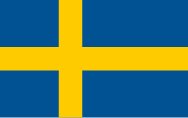 |
 |
 |
There are a lot of places in Lithuania, Latvia, Estonia, Finland, Sweden, Norway, and Denmark with names of Ancient Turkic origin. Many of them are located close to CWC sites, which increases the accuracy of the transcripts. For example, one of the clusters of Turkic place names was found on the eastern shore of the Oslofjord, around which there are several sites of CWC:
Askim, a town and a municipality in Østfold county, Norway. – Chuv ăs "to scoop", kimĕ "a boat".
Jeløya, an island in the municipality of Moss – Chuv yĕlĕ 1. "rain worm", 2. "tear (eye-water)".
Kambo a village in the municipality of Moss – Chuv kămpa "mushroom".
Oslo, the capital of Norway – Chuv aslă "great, major".
Ørmen, a village in Fredrikstad municipality – Chuv vărman "forest".
Son, an old town in Vestby municipality – Chuv aslă 1. "face", 2. "view", 3. "color".
Spro, a village in Nesodden municipality – Chuv săpray "the common name of tools, e.g. tools of the fishery".
Here are some more examples:
Arendal, a town in Aust-Agder county, Norway – Chuv uram "street", dal "area outside house", "outside".
Helsinki, the capital city of Finland – Chuv. khĕl "winter", sĕnk, sĕnkke "doze", "slumber". In the etymological dictionary of the modern Finnish language, it is indicated that the name of the city has various explanations, but the hypothesis of its Swedish origin is considered to be the most acceptable. Allegedly, in the early Middle Ages, the Swedes arrived in this area and called it in some similar way, but how it is not specified (HÄKKINEN KAISA. 2007: 185).
Jurgiškės, a village in Lithuania – Chuv çărkha (Common Turkic jorğa/jurğa) "ambler, pacer".
Kunda, a town and the Kunda River, Estonia – Chuv khuntahelp, assistance"
Läby, a locality in Uppsala County, Sweden – Chuv lapă "flat plot", "glade".
Mandal, a town in Vest-Agder county, Norway – Chuv măn "large, great", tul "area outside of the house", "outside".
Nereta, a town in Latvia – Chuv neret "a kind of fish-net"
Onsala, a locality in Halland County, Sweden – Chuv an "wide", sulă "raft", "ferry".
Pärnu, a city in southwestern Estonia – Chuv parne "a gift, present, sacrifice".
Quoluwany, the ancient name of the city of Tallinn, Estonia – Chuv külĕ "lake", văn imitation of buzz, buzzing. The explanation of the name is such: Clouds of mosquitoes flying over the lake and buzzing. Cf. Szurpily.
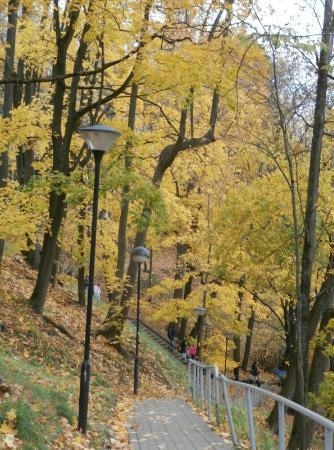
Salo, a town in Finland – Chuv sulă "raft", "ferry" or sala "a great village".
Sösdala, a locality in Hässleholm Municipality, Skåne County, Sweden – Chuv süs "hemp fiber", tăla "cloth"
The photo at right: Mountain Toomemägi in Tartu
Tartu, a city in Estonia – Chuv tără "summit" and tu "a mountain". There is in the city the mountain Toomemägi.
Torsås a locality in Kalmar County, Sweden – Chuv tur (tură) "divinity", sas "voice".
Turku, a city in Finland – Chuv. turkhi "bidding" from Old Chuv. *turku "site, marketplace". Slavic torg "trade" and similar words in many languages originate from this word.
Uppsala – Chuv appa "an old sister, aunt", sulă "raft", "ferry".
 |
GERMANY
The Turkic ethnicity of the creators of CWC makes readers question it. This is especially true for readers from Western Europe. For a more convincing separate map has been drawn up of sites CWC and Turkic place names in Germany (see below).
The icons as lights show sites of CWC in Germany, and points are place names decrypted with the Chuvash language. Some of them are listed below.
Aisch, Neustadt an der Aisch, a small town in the northern part of Bavaria – Chuv uj "field", jysch "family, owner, farm" (in other Türkic jiš "forest").
Alps, а mountain rang in Europe – Chuv. Ulăp "hero, giant".
Ascha, a municipality in the district of Straubing-Bogen in Bavaria – Chuv ăšă "warm".
Aspach, a commune in the Haut-Rhin department in Alsace in north-eastern France, a commune in the Moselle department in Lorraine in northeastern France, a community in the Rems-Murr-Kreis in Germany (Baden-Württemberg), a village and a former municipality in the district of Gotha in Thuringia, a municipality in the district Braunau am Inn in the Austrian state of Upper Austria, – Chuv. ash "to puddle, knead mud, wade", păkh "bog, mud, slush, faeces".
Bacharach, a town in Rhineland-Palatinate, – Chuv. păhăr "copper", akh "evil spirit". There are forty kilometers to the southwest from the town's historic copper mine Fischbach, open to visitors. In the town, there is a restaurant "At copper jug".
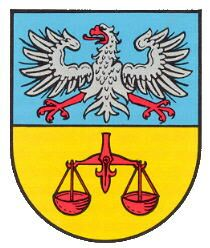
Baruth – Chuv par "to give,pay, sell", ut "a horse"
Böhl-Iggelheim, a municipality in the Rhein-Pfalz-Kreis, in Rhineland-Palatinate -Chuv ikkĕle "to double", ikkĕllĕ "duality". The historical coat of arms of Iggelheim with the balance can symbolize the duality of the court (see right).
Borna, a town in the Free State of Saxony
– Chuv parne "present, gift".
Chrudim, a city in Eastern Bohemia – Chuv khěrü "hot, passionate" and tim "assiduity".
Cottbus, a city in Brandenburg, – Chuv kat "dike, dam" and păs "to break, disturb".
Fürth, a city in Bavaria, – Chuv pürt "peasant house".
Gerach, a municipality Rhineland-Palatinate and a community in Upper Franconia (Bavaria) – Chuv. kĕr "autumn", akh "evil spirit".
Goslar, a town in Lower Saxony – Chuv kas "village", lar "to reside, sit"
Hadamar, a town in Hessen – Chuv khăt "comfort, beauty, luck", ămăr "warm and still".
Hartha, a town in the district of Mittelsachsen, in the Free State of Saxony – Chuv khărta – 1. "patch, clout", 2. "rough country".
Itzehoe, a town in Schleswig-Holstein – Chuv ĕç "work", khăyă "light, fire".
Jastorf, a village in Lower Saxon – Chuv yăs "smoke", tărpa "chimney".
Jena, a University city in Thuringia – Chuv yĕnĕ "den, lair, couch".
Jürgenshagen, a municipality in the Rostock district of Mecklenburg-Vorpommern, Germany – Chuv çărkha (Common Turkic jorğa/jurğa) "ambler, pacer". See Zorge.
Jürgensby, a part of the city of Flensburgs – Chuv çărkha (Common Turkic jorğa/jurğa) "ambler, pacer". See Zorge.
Jürgenstorf, a municipality in the Rostock district of Mecklenburg-Vorpommern, Germany – Chuv çărkha (Common Turkic jorğa/jurğa) “ambler, pacer”. See Zorge.
Jüterbog, a historic town in the Teltow-Fläming district of Brandenburg – Chuv yüte "to be exhausted", păk "to sleep, die"
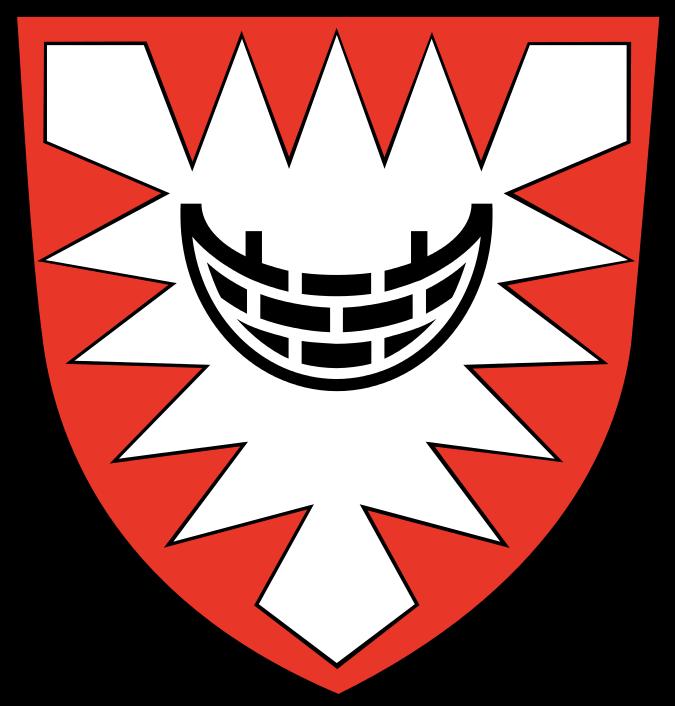
Kandel, a town in the district of Germersheim, in Rhineland-Palatinate and a mountain of the Black Forest – Chuv kăn "potash", tĕl "place, country". Potash was recieved from wood in the Black Forest long since. There is the village of Kantelina in Vinnytsia Region of Ukraine.
Kiel, the capital of northern German state of Schleswig-Holstein – Chuv kil "house, family, yard". The coat of arms of the city of Kiel is the so-called Holstein nettle leaf. The brick-built boat symbolizes city rights by the association with a city-courtyard wall (see left).
Kirkel, a municipality in the Saarpfalz district, in Saarland – Chuv khyr "pine-tree", kĕl "ashes".
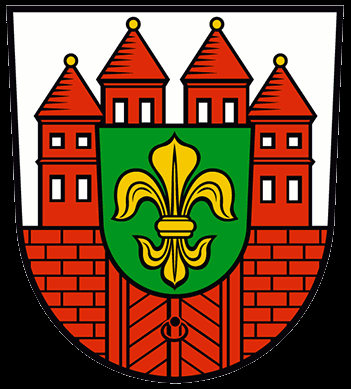
Kyritz, a town in the Ostprignitz-Ruppin district, in Brandenburg – Chuv kĕr "autumn", eç "work". There is in the center of the city Coat of arms a golden sheaf symbolizes the finish of fieldwork (see. right).
Nailaa, a town in Bavaria – Chuv. năyla "to hum, squeak, buzz,"
Nohra, a municipality in the Weimarer Land district of Thuringia, – Chuv nakhra "horn".
Nürnberg (at first Nuremberg), a city in the state of Bavaria – Chuv nür "moist, humid", en "site, land". This explanation is confirmed by preserved alluvial sediments of floods of the Pegnitz River in the northern and north-eastern part of the city.
Pankow, the highest populated and the third borough of Berlin – Chuv pankav "silly"
Parchim, a town in Mecklenburg-Vorpommern – Chuv par "to give", khĕm "fire, flame".
Perkam, a municipality in the district of Straubing-Bogen in Bavaria – Chuv pĕr "lonely, single, whole, allein, alike", kăm "ash".
Salem, a municipality in the Bodensee district of Baden-Württemberg – Chuv selĕm "good, nice, beautiful"
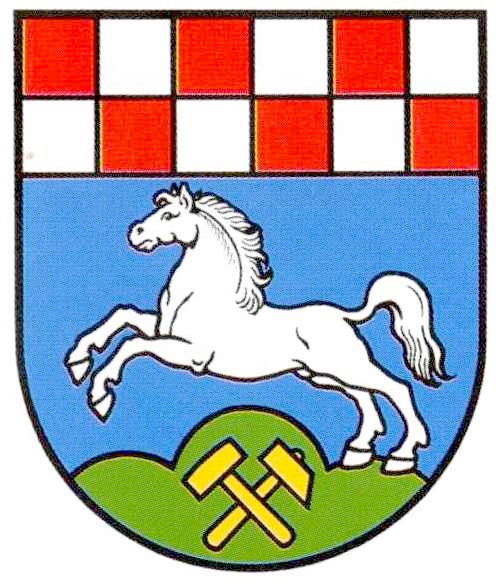
Tarthun, a village and a former municipality in the district Salzlandkreis, in Saxony-Anhalt – Chuv tărtan "to swell", turtăn "to stretch out, lengthen", turtăm "load"
Teklenburg, a town in the district of Steinfurt, in North Rhine-Westphalia – Chuv tĕkle "still, quiet".
Zorge, a municipality in the district of Osterode, in Lower Saxony, Germany – com Türk. jorğa/jurğa "troat, amble" (Chuv çărkha). The municipality has a coat of arms with a jumping horse (see left). The meaning of the name remained in human memory for many centuries.
So, we have a few matches between place names of Turkic origin and heraldry. Some of them may be random, but in other cases, the name is explained by the motivation of terrain features or the probability of correspondence seems unlikely (as in the case of the name Zorge). There are two possible explanations for this phenomenon: 1. The population of Türkic origin coexisted with the new settlers (the Celts and later the Germans) for several millennia and was assimilated already at the historical time. 2. Interpretation of the names given by Türks remained in the memory of the local population regardless of its language during the same time.
 |
SWITZERLAND
Baar, a municipality in the canton of Zug in Switzerland – Chuv păhăr "copper".
Basel, a city – Chuv păsăl "to spoil, deteriorate, become worse"
Basel, a city – Chuv păsăl "to spoil, deteriorate, become worse"
Bützberg, a locality in the municipality Thunstetten of Oberaargau district in the canton of Bern – Chuv. puç "head"/
Turgi, a former municipality in Baden district in the canton of Aargau – OT *turku (Chuv. turkhi "bidding").
Utzenstorf, a municipality in Emmental district in the canton of Bern – Chuv. uççăn "free, open, clear".
Ancient Turkic Place Names in Central and Northern Europe
(Full List)


